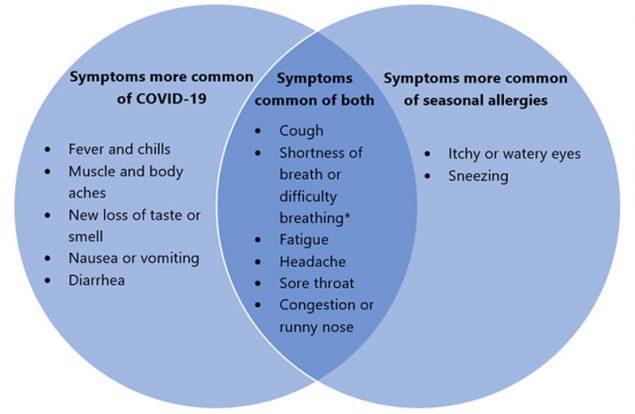What is Covid-19?
- Coronavirus (COVID-19) is an illness caused by a virus that can spread from person to person.
- The virus that causes COVID-19 is a new coronavirus that has spread throughout the world.
- You can become infected by coming into close contact (about 6 feet) with a person who has COVID-19.
- You can become infected from respiratory droplets when an infected person coughs, sneezes, or talks.
- You may also be able to get it by touching a surface or object that has the virus on it, and then by touching your mouth, nose, or eyes.
Symptoms of Covid-19:
- Fever or chills
- Cough
- Shortness of breath or difficulty breathing
- Fatigue
- Muscle or body aches
- Headache
- New loss of taste or smell
- Sore throat
- Congestion or runny nose
- Nausea or vomiting
- Diarrhea
*People with COVID-19 have reported a wide range of symptoms – ranging from mild symptoms to severe illness. Symptoms may appear 2-14 days after exposure to the virus.
How to stop the spread:
- Stay home if you are sick, unless it is to get medical attention.
- Stay home as much as possible and avoid close contact with others.
- Avoid touching your eyes, nose, and face.
- Wash your hands often with soap and water for at least 20 seconds.
- Use an alcohol based hand sanitizer that contains at least 60% alcohol.
- Clean and disinfect frequently touched surfaces.
- Always remain 6 feet from other people when you are out in public.
- Don't forget to wear a mask!
How Covid affects older adults:
Among adults, the risk for severe illness from COVID-19 increases with age, with older adults being at the highest risk. For example, people in their 80's are at a higher risk for severe illness than people in their 50's. The greatest risk for severe illness from COVID-19 are those aged 85 or older. Severe illness means that the person with COVID-19 may require hospitalization, intensive care, or a ventilator to help them breathe. There are also other factors that can increase your risk for severe illness, such as having underlying medical conditions. The CDC has reported that 8 out of 10 COVID-19 deaths in the U.S. have been in adults aged 65 years or older.
Have seasonal allergies?
Sometimes seasonal allergies and COVID-19 can look very similar to one another, but they have their differences as well. For example, COVID-19 can cause fever, which is not a common symptom of seasonal allergies. Since it can be difficult to tell the difference between the two, you may need to get a test to confirm your diagnosis. Take a look at the diagram below to help distinguish between the symptoms:
*Seasonal allergies usually do not cause shortness of breath or difficulty breathing, unless a person has a respiratory condition such as asthma that can be triggered by exposure to pollen.
For more information on Covid-19 versus seasonal allergies visit the CDC's website here: https://www.cdc.gov/coronavirus/2019-ncov/need-extra-precautions/people-with-seasonal-allergies-faqs.html
For more information on Covid-19 versus seasonal allergies visit the CDC's website here: https://www.cdc.gov/coronavirus/2019-ncov/need-extra-precautions/people-with-seasonal-allergies-faqs.html
For more resources:
- Symptoms: https://www.cdc.gov/coronavirus/2019-ncov/symptoms-testing/symptoms.html
- Testing information: https://www.cdc.gov/coronavirus/2019-ncov/testing/index.html
- Prevention: https://www.cdc.gov/coronavirus/2019-ncov/prevent-getting-sick/index.html
- If you are sick: https://www.cdc.gov/coronavirus/2019-ncov/if-you-are-sick/index.html
- People at increased risk: https://www.cdc.gov/coronavirus/2019-ncov/need-extra-precautions/index.html
- Stress, coping, and hotline numbers: https://www.cdc.gov/coronavirus/2019-ncov/daily-life-coping/managing-stress-anxiety.html
- 5 tips for staying productive & mentally healthy while you're working from home: https://time.com/5801725/work-from-home-remote-tips/
- 8 steps for managing through tough times: https://www.bridgespan.org/insights/library/strategy-development/eight-steps-for-managing-through-tough-times
- What you should know when claiming unemployment insurance benefits: https://www.michigan.gov/leo/0,5863,7-336-94422_97241_89980---,00.html
- Apply for unemployment benefits: https://www.michigan.gov/leo/0,5863,7-336-94422_97241---,00.html
- Risk Tracker - https://www.microcovid.org/
- Finding reliable information about Covid-19 - https://deakin.libguides.com/Covid-19-reliable-information
- How to Spot Fake News (Covid-19 edition) - https://www.infodocket.com/2020/04/20/ifla-releases-how-to-spot-fake-news-covid-19-edition/
- Find a Covid-19 vaccine near you - https://www.vaccines.gov/

